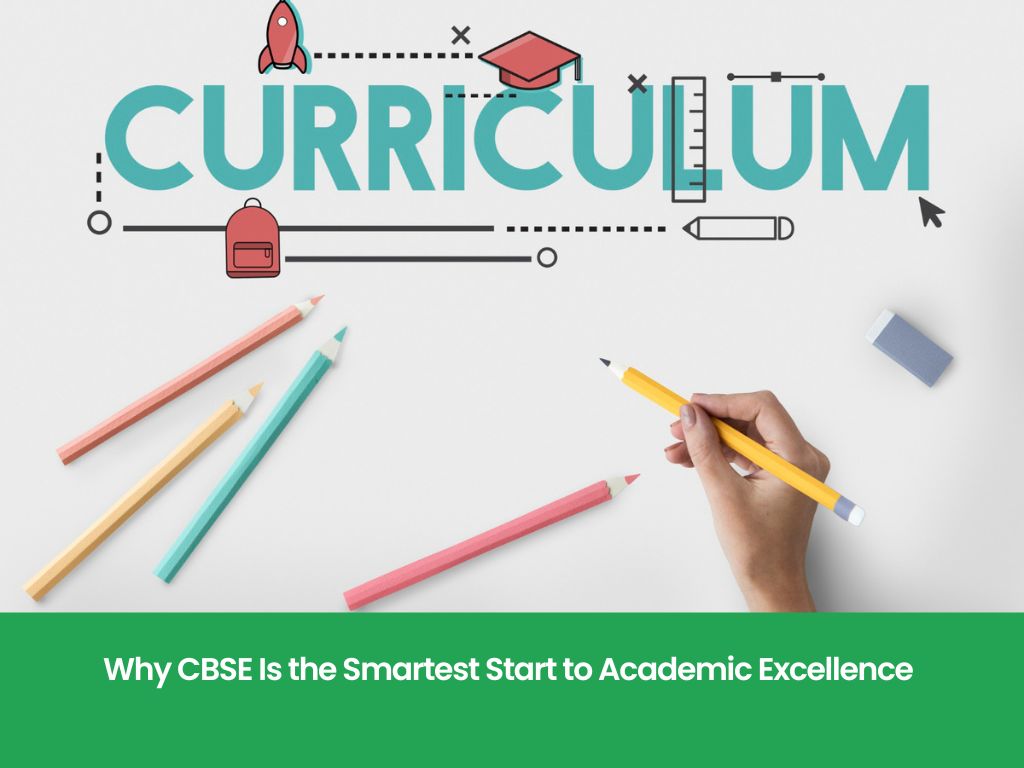Introduction
In the rapidly changing education environment of the present, the groundwork we establish in a child’s early years has never been so critical. From kindergarten to the primary years, an appropriate curriculum can fuel inquiry, build foundational skills, and instill a passion for lifelong learning. Of the many education boards operating in India, the Central Board of Secondary Education (CBSE) is perhaps the most organized in its methodology and dedicated to scholastic excellence.
But what is it about the CBSE curriculum that makes it so effective, particularly during the formative stages of a student’s life? Let’s see how this national-level educational system fosters intellectual brilliance from the early stages.
1. Strong Conceptual Foundation
Perhaps the most characteristic element of the CBSE curriculum is its emphasis on conceptual understanding. In contrast to crammer-based systems that focus on memorization, CBSE promotes comprehension rather than cramming. From math to environmental science, the curriculum is aimed at making sure that students comprehend the “why” behind each concept, preparing them for more advanced learning in subsequent years.
For young students, this is particularly crucial. A student who knows why 2 + 2 is 4 is much more likely to learn superior algebra later on. Through encouraging rational thought and critical thinking, CBSE guarantees that students don’t merely learn—exactly, they comprehend.
2. Nationally Standardized Learning with Global Relevance
CBSE is a national board, yet its applicability is international. The syllabus matches national educational standards while adopting worldwide best practices. This equilibrium ensures not only that students fulfill local criteria but also that they are equipped to take competitive exams and international education systems.
Moreover, NCERT books—particularly those designed by NCERT—are famous for their simplicity and lucidity, thus making great learning tools for young students. These books expose them to the world of practical applications, tales, and illustrations that also reflect their day-to-day lives.
3. Focus on Holistic Development
Excellence in academics is not all about grades. It’s more about empowering the entire child—intellectually, emotionally, socially, and physically. The curriculum of CBSE incorporates co-scholastic activities such as art, physical education, and values into the learning process as a whole.
Right from a young age, students are supported in exploring extra-curricular activities, group discussions, and improving communication skills. This balanced methodology not only develops holistic individuals but also promotes learning by improving confidence, motivation, and collaboration.
At Gyan Ashram School, a Best School in Jaipur, this CBSE philosophy is deeply embedded in the daily teaching practices. We believe that real academic excellence comes from a place where children are not just taught but inspired.
4. Age-Appropriate Pedagogy and Assessments
The CBSE board considers the developmental psychology of children, particularly during early childhood. Instead of loading the young mind with unwarranted pressure, the curriculum introduces topics step by step, keeping in mind the child’s mental maturity and emotional intelligence.
Assessment trends are also changing. The trend has shifted from conventional paper-and-pencil examinations to formative and activity-based assessments. Through group activity, presentations, narration, and project work, children have multiple channels to communicate their knowledge.
These assessment methods not only decrease the stress of exams but also give a better picture of a child’s academic and personal development.
5. Incorporation of Life Skills and Value Education
The initial years are most important not only for academic education but also for personality development. CBSE has modules on emotional intelligence, life skills, ethics, and environmental awareness. These aspects are not taught in isolation but incorporated throughout subjects.
For instance, a tale in a textbook might emphasize the value of honesty or compassion, subtly imprinting values that mold young minds. With time, these lessons become second nature to a child’s personality, determining their educational and life decisions.
At Gyan Ashram School, one of the Best Schools in Jaipur, we pride ourselves on not just making our students excel in exams but developing them into responsible, ethical, and empathetic citizens who are prepared to give back to society.
6. Continuous Innovation and Curriculum Updates
CBSE is not stagnant. The board keeps updating its content to suit the evolving needs of the world. Curriculum changes have recently incorporated coding at lower levels, financial education, AI-based integration, and competency-based learning.
This proactive attitude keeps the students academically competitive and future-prepared. Those schools that support CBSE’s cause closely tend to be incubators of innovation in learning, introducing modern methodology to teaching while not neglecting the basics.
7. Smooth Transition to Higher Education
Starting early with CBSE doesn’t just help in primary years—it sets the stage for a smooth academic journey through middle and senior school. Subjects and concepts are introduced progressively, building on previous knowledge. This cumulative learning model helps children transition naturally into more advanced topics without feeling overwhelmed.
Further, since the majority of India’s competitive examinations—from NEET to JEE—are patterned after the CBSE syllabus, students learning under this syllabus get a natural edge.
Conclusion: A Curriculum That Builds Futures
When parents consider academic excellence, they tend to envision high grades, prizes, and university placements. Those are significant, but actual excellence begins early—with curiosity ignited in a child’s eyes, confidence in their voice, and joy in learning.
A CBSE curriculum is the ideal soil in which such growth can take place. With its child-oriented, academically rigorous, and forward-looking design, it moulds students not only for exams, but also for life.
If you want to provide your child with this head start, selecting a school that espouses CBSE’s vision in all sincerity makes all the difference. Gyan Ashram School, one of the Top School in Jaipur, is a shining example of how exposure at an early age to a well-organized curriculum can turn children into thinkers, leaders, and lifelong learners.

